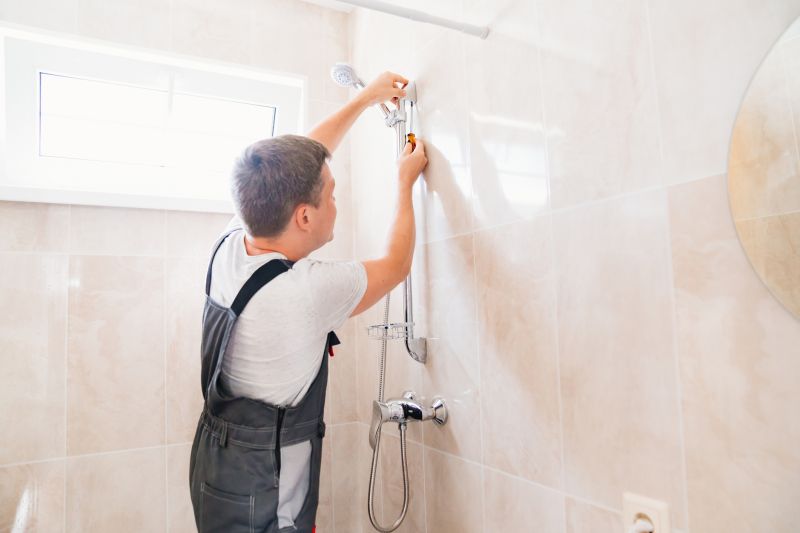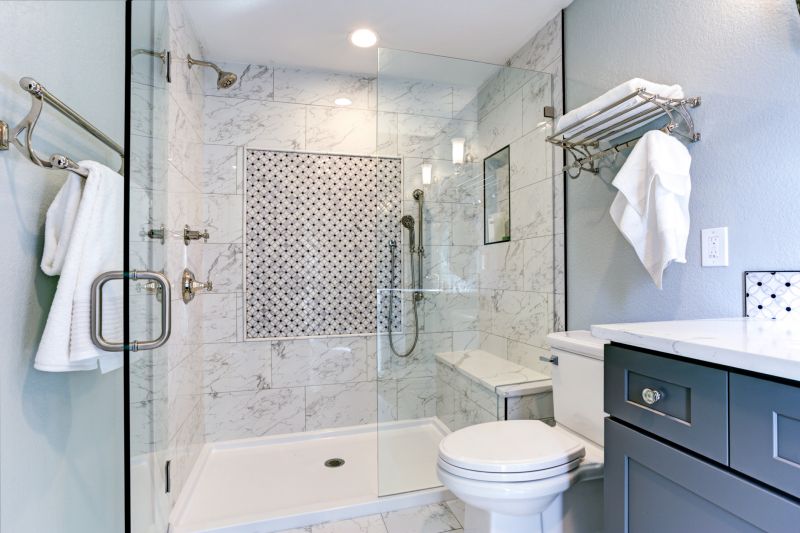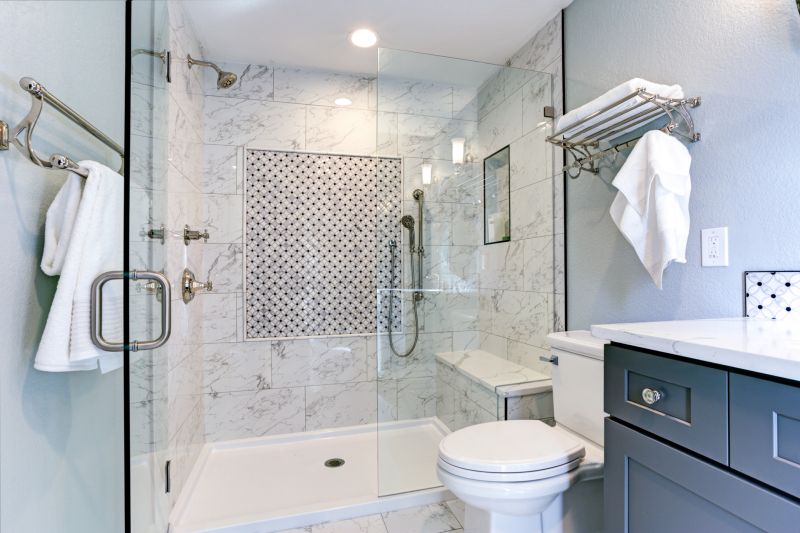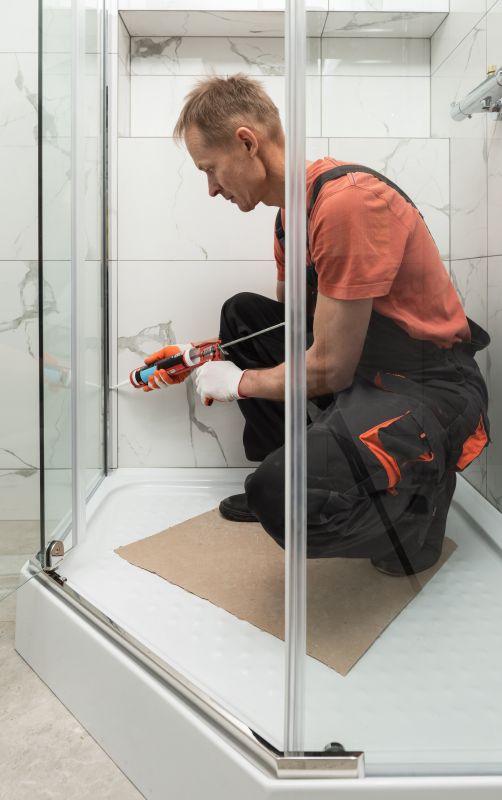Shower Wall Panel Installation
Welcome to Aberdeen Showers
Shower Wall Panel Installation

About Shower Wall Panel Installation
Shower wall panels have become a popular choice for homeowners looking to update their bathrooms with a modern and stylish touch. They offer a seamless and sleek appearance, providing an alternative to traditional tiles. Understanding the key considerations and options available can help in making an informed decision when selecting shower wall panels for your home.
One of the primary considerations when choosing shower wall panels is the material. Common materials include acrylic, PVC, and laminate. Each material has its own advantages, such as water resistance, ease of cleaning, and durability. Homeowners should consider the specific needs of their bathroom environment when selecting a material.
The size and layout of the bathroom also play a significant role in the installation process. Panels come in various sizes, and choosing the right size can minimize the number of joints and seams, enhancing the overall aesthetic. It's essential to measure the shower area accurately to ensure a proper fit.
Color and design are crucial elements to consider. Shower wall panels are available in a wide range of colors, patterns, and finishes. Whether you prefer a classic white, a bold color, or a natural stone look, there are options to suit every taste. Consider the overall theme and color scheme of your bathroom when making a selection.
The installation method is another important factor. Some panels are designed for direct adhesion to existing surfaces, while others may require a framework or batten system. Understanding the installation requirements can help determine the best option for your bathroom and ensure a smooth process.
Maintenance and cleaning are also important considerations. Shower wall panels are generally low-maintenance compared to traditional tiles, as they lack grout lines where mold and mildew can develop. Regular cleaning with a non-abrasive cleaner is usually sufficient to keep them looking new.
Additionally, consider the long-term benefits of installing shower wall panels. They provide a watertight seal that helps prevent water damage and leaks, contributing to the longevity of your bathroom. This feature is particularly beneficial in homes where moisture control is a concern.
When selecting shower wall panels, it's helpful to keep in mind the following features:
- Water resistance
- Ease of installation
- Variety of styles and finishes
- Durability
- Low maintenance requirements
In summary, shower wall panels offer a versatile and attractive solution for updating your bathroom. By considering factors such as material, size, color, installation method, and maintenance, homeowners can select panels that meet their needs and enhance the overall aesthetic of their space.

Choosing the Right Shower Wall Panels
Materials, Styles, and Finishes
When renovating a bathroom, selecting the right shower wall panels can significantly enhance both the aesthetic and functional aspects of the space. Shower wall panels offer a sleek, modern look and are available in a variety of materials, styles, and finishes to suit any design preference. Understanding the options available can help in making an informed decision that complements the overall design of your bathroom.
Materials are a critical factor in choosing shower wall panels. Common options include acrylic, PVC, and laminated wood. Each material has its unique advantages. Acrylic panels are known for their durability and ease of maintenance, while PVC options are lightweight and resistant to moisture. Laminated wood panels offer a natural appearance, adding warmth and texture to the bathroom environment.
The style of the shower wall panels should align with the overall theme of the bathroom. For a minimalist look, consider panels with a smooth, glossy finish. Textured panels can add depth and interest, making them a suitable choice for more traditional or rustic designs. Some panels even mimic the look of natural stone or tile, providing an elegant appearance without the associated upkeep.
Finishes play a significant role in the final look of the shower area. High-gloss finishes reflect light, making small bathrooms appear larger and more open. Matte finishes, on the other hand, offer a subtle elegance and are excellent for hiding water spots and fingerprints. The choice between gloss and matte largely depends on personal preference and the desired ambiance of the space.
In addition to aesthetics, functionality is paramount when selecting shower wall panels. Consider panels with water-resistant properties to prevent mold and mildew growth. Panels with interlocking edges ensure a seamless installation, reducing the likelihood of leaks. Additionally, opting for panels that are easy to clean can save time and effort in maintaining a pristine shower environment.
For those exploring different options, here are some considerations:
- Choose a material that complements your bathroom's humidity levels.
- Consider the ease of installation and whether professional assistance is needed.
- Think about future maintenance and cleaning requirements.
- Select a style that enhances the overall design of your bathroom.
Ultimately, the right shower wall panels can transform a bathroom, offering a blend of style and practicality. By carefully considering materials, styles, and finishes, homeowners can create a shower space that is both functional and visually appealing. Whether aiming for a contemporary look or a classic feel, the right choice of shower wall panels can make all the difference.

Step-by-Step Installation Guide for Shower Wall Panels
Tools, Preparation, and Installation Process
Shower wall panels provide a sleek and modern alternative to traditional tiling, offering a seamless and water-resistant surface that enhances the bathroom's aesthetic. Installing these panels can be a straightforward process if approached methodically. This article outlines the essential steps for homeowners interested in installing shower wall panels to achieve a flawless finish.
Before beginning the installation, it is crucial to gather all necessary tools and materials. Basic tools such as a level, measuring tape, utility knife, caulking gun, and adhesive are essential for this project. Additionally, ensure you have the appropriate number of panels to cover the designated shower area, as well as any finishing trims or accessories required for the installation.
Preparation is key to a successful installation. Start by cleaning the shower area thoroughly, removing any existing tiles or wall coverings. The surface should be smooth, dry, and free of debris to ensure the panels adhere properly. Measure the shower walls accurately and mark the positions for the panels, accounting for any fixtures or fittings that may need to be cut around.
Once the preparation is complete, you can begin installing the panels. Apply adhesive evenly to the back of the first panel using a notched trowel. Carefully position the panel on the wall, ensuring it is level and aligned with your markings. Press firmly to secure it in place, and repeat the process for the remaining panels, maintaining a consistent gap for any expansion or contraction.
After all panels are installed, it's time to seal the edges and joints. Use a high-quality silicone sealant to fill any gaps between the panels and around the edges, ensuring a watertight finish. Smooth the sealant with a damp finger or a finishing tool to achieve a neat appearance. Allow the adhesive and sealant to cure fully according to the manufacturer's instructions before using the shower.
- Gather necessary tools and materials.
- Prepare and clean the shower area.
- Measure and mark panel positions.
- Apply adhesive and install panels.
- Seal edges and joints with silicone.
Completing the installation of shower wall panels can transform the look of your bathroom, providing a modern and low-maintenance solution. By following these steps, homeowners can enjoy a refreshed and durable shower space that enhances the overall appeal of their home. Proper care and maintenance will ensure the panels remain in excellent condition for years to come.




